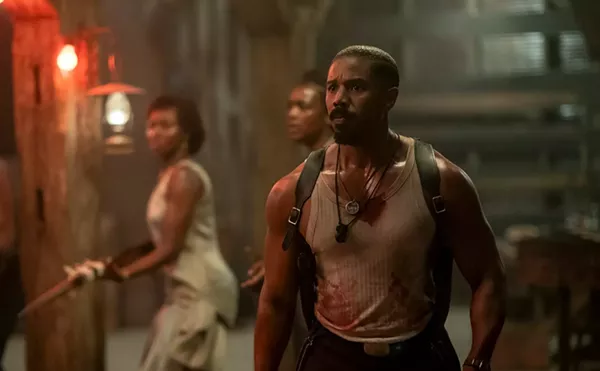
Audio By Carbonatix
[
{
"name": "GPT - Leaderboard - Inline - Content",
"component": "35519556",
"insertPoint": "5th",
"startingPoint": "3",
"requiredCountToDisplay": "3",
"maxInsertions": 100,
"adList": [
{
"adPreset": "LeaderboardInline"
}
]
}
]
It's not just that Dorothy Fadiman offers no explanation for those who seriously question the results of the 2004 presidential election (and I count myself as one), her documentary should have been an eye-opening, gut-twisting expose of American voting practices gone horribly wrong. Lord knows, there are enough of us waiting for someone to show up with the smoking gun that incontrovertibly implicates Bush and co. in massive election fraud. And the timing couldn't be better. Once again our country is going into a closely contested election and, once again, no one seems worried that our system of voting is embarrassingly inadequate. Unfortunately, instead of a boldly insightful investigation, the provocatively titled Stealing America: Vote By Vote is the cinematic equivalent of a 90-minute Daily Kos blogger post. Which is to say, a comprehensive overview of suspicious activities and intriguing circumstantial evidence delivered in a clumsy, haphazard and earnestly bland way. To quote Walter Mondale's 1984 presidential election campaign slogan: "Where's the beef?"
Besides lacking concrete evidence to back up her title's claim — much is innuendo —she fails to ask some pretty important questions. For instance, if George Bush stole the election from John Kerry in hotly contested battleground states such as Ohio, why didn't Kerry challenge the results? Heck, why did he concede the race before Ohio's totals even came in? Maybe there's a good reason. We'll never know because Fadiman's level of inquiry is relegated to stuff that's been bouncing around the Web for the last four years.
Even when cataloging the laundry list of suppression tactics — uncounted ballots, electronic vote switching, misinformation campaigns, under votes and shocking examples of minority voters being denied the same services suburban white voters received — she never really digs in. A significant amount of time is dedicated to the sudden inaccuracy of exit polling (after decades of reliability) but no conclusion is drawn. Worse, conflicting and contrary arguments are ignored, which pushes Fadiman's film into the realm of propaganda, since every revelation implies only one possible explanation. And true to the conspiracy theorists' approach, nobody specific is confronted and no explanation for how these strategies were coordinated or implemented is given.
There is no doubt the film's disturbing examples warrant deeper examination but all Stealing America seems interested in doing is reinforcing and capitalizing on our feelings of paranoia and impotence. Along with the usual documentary suspects — assorted retired politicians, data analysts and political journalists — Robert F. Kennedy Jr., BBC investigative journalist Greg Palast, pollster John Zogby and Paul Craig Roberts (assistant secretary of the treasury under President Ronald Reagan) are on hand to fan the flames of despair. Back in 2004, all of them suspected something was rotten in the state of the union and as a demonstration of Fadiman's inadequacies as a documentarian, not one of them offers a meaningful explanation as to how the Republicans were able to pull it off. Nor are they as compelling as the anecdotal evidence offered by ordinary citizens, who recount their distressing experiences with the 2004 vote. This is where the film excels: cataloging the unsettling tactics and strategies political parties — mostly Republicans — use to thwart the will of the people. It's an appalling and un-American assault on the basic rights of citizens that should shock the uninitiated (if you could ever get them to watch). Which speaks to the other fundamental question Fadiman misses: Why don't Americans seem to care that their election system is broken and what will it take to fix it
Stealing America clearly wants to be a cautionary call-to-arms to safeguard this November's election against fraud. Unfortunately, short on answers or factual data, its murky evidence, scattershot approach and bland A&E aesthetic are unlikely to incite any but the most fervent of believers. At its end Fadiman's film urges the audience to "take our country back." Too bad her doc not only doesn't know from whom, it offers no suggestions for how.
Opens Friday, Aug. 22, at the Main Art Theatre, 118 N. Main St., Royal Oak; 248-263-211.





